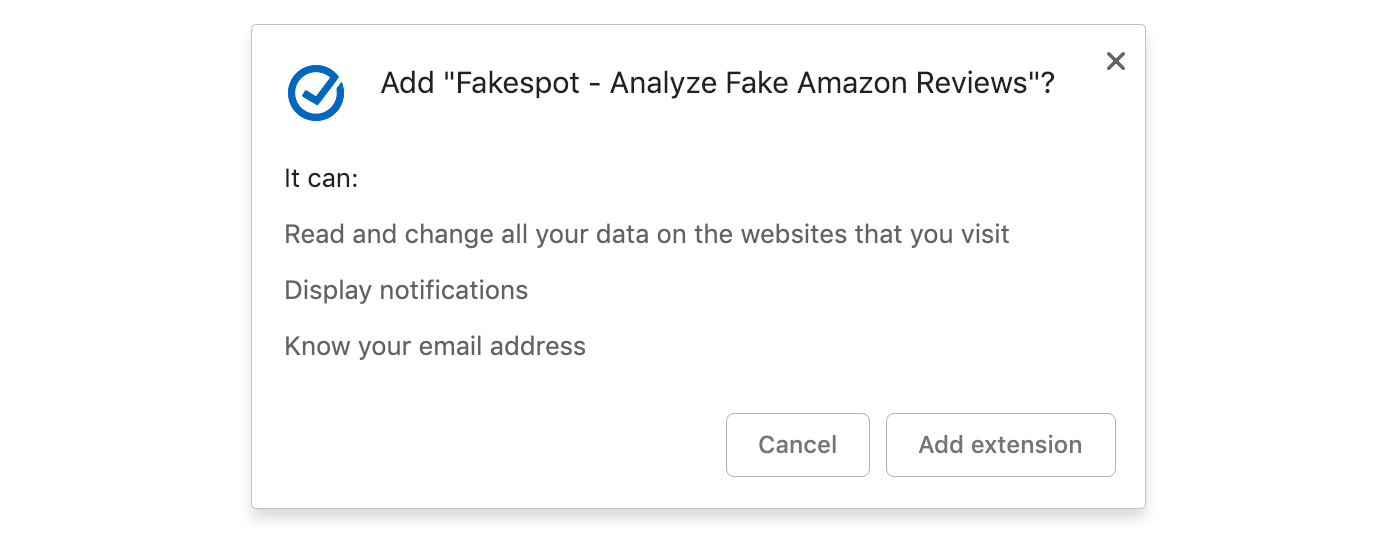How to use Fakespot by Mozilla

Growing suspicious of online reviews? So were we.
Fakespot provides consumers with a new way of filtering product reviews to find out what real users are saying about the products you want to buy. Our proprietary technology analyzes millions of product reviews, looking for suspicious patterns and incentivized reviews. We then weed out the reviews we think are unreliable. Don’t take our word for it — You be the judge.
Learn about all the ways to use Fakespot: to learn more… visit https://www.fakespot.com/about/how-to-use-fakespot.
How do the Fakespot Grades Work?

Fakespot only analyzes product and business reviews to determine how reliable they are. We provide an easy to understand Fakespot Review Grade to show whether or not the reviews can be trusted:
A and B: Reviews are reliable
C: Mix of reliable and unreliable reviews
D and F: Insufficient reliable reviews
We also give a grade to the company, which is the average of all of their products’ Fakespot Review Grades. We do not give an opinion on the quality of the product, service, or company. We only give our opinion on the reliability of online consumer reviews.
Does a low Fakespot Grade mean the product or service is bad?

No. Fakespot does not review any products or companies. We only grade the reviews so you can know whether the reviews can be relied on.
What criteria are used by Fakespot when analyzing reviews?

We use artificial intelligence that has been trained to pick up on patterns. The more data that flows into the system, the better the system gets at the detecting fake and unreliable content. Our algorithms run through multiple tests to determine if a review is authentic or not.
We do not reveal any additional information about our methods for detecting fake and unreliable content because we want to help protect consumers and prevent fake and unreliable reviews from avoiding detection by Fakespot.
What web sites and online stores are supported by Fakespot?

We currently support the following websites:
- Amazon™
- Amazon™
- Amazon™
- BestBuy™
- Flipkart™
- Home Depot™
- Sephora™
- Steam™
- TripAdvisor™
- Yelp™
- Walmart™
We will soon support other platforms, so keep an eye out as we add more!
Where is the Analyzer Bar?

The analyzer bar can still be found here: https://www.fakespot.com/analyzer
We know that extensions and apps are not for everyone so the original Fakespot Analyzer will always be available at the above site.
What permissions do you require and why?

When you install a Fakespot Chrome Plugin, you will get asked for a few permissions. For Chrome, it will look something like this:

We require a few permissions from your browser in order to make the extension perform properly. Below, we explain why we require these permissions.
"Read and change all your data on the websites you visit"
The extension inserts Fakespot Grades on our supported websites automatically, but in order for us to do this we require this permission.
Without this permission, we are unable to "edit" the page and insert the Fakespot Grades into the website.
"Know your email address?"
Your email address is associated to settings that you save within the extension. We will be adding more customizable options in future versions so that we can save you time and money as you shop online.
As such, we do not require you to create an account or register. We are very serious about your privacy and encourage you to read our terms of use and privacy notice.
If you still don't feel comfortable using the extension, you can always use our equally powerful website analyzer at fakespot.com.
What are Fakespot Trusted Deals?

Fakespot Trusted Deals are from trusted partners that we handpicked for our users.
Trusted Partners are only allowed into the Fakespot Trusted Deals program if they are honest and trustworthy and have demonstrated that they provide products and services that are free from fake reviews and consumer deception. The Trusted Deals we show are products we want to buy from companies that stand by their stuff with great service.
Different Fakespot Grades for Products with Variations on Amazon

Amazon organizes all of its products by Amazon ID Numbers or ASINS. Reviews on Amazon are also organized by ASIN.
When an Amazon product page has only one product there is only one set of reviews for Fakespot to analyze.
However, when an Amazon product page has multiple versions of the product (sizes, quantity, colors, features, etc) there will be multiple sets of unique reviews for Fakespot to analyze. These are also known as product variations.
When this happens, you may notice different Fakespot Grades for what seems to be the same product, but it is not the same product because each product has a unique UPC and on Amazon a unique ASIN.
Fakespot analyzes products by ASIN to provide the most accurate eCommerce protection because one variation of the product might have been used to seed the Amazon listing with fake reviews in order to drive all product variations sales.
Can Fakespot for Amazon be used by buyers located outside of the US?

Fakespot currently supports:
- Amazon.com
- Amazon.com.au
- Amazon.ca
- Amazon.de
- Amazon.es
- Amazon.fr
- Amazon.in
- Amazon.it
- Amazon.co.jp
- Amazon.co.uk
Why are Unverified Amazon reviews considered unreliable?

On Amazon, when the system associates a product review with a product purchase, that review is from a "verified purchaser". Reviews from a verified purchase tend to be reliable (please see the next question below), since Amazon has already confirmed an actual purchase of the product being reviewed.
On the flip side, if an Amazon review is not from a “verified purchaser” there is no way of knowing for sure if the reviewer purchased or even used the product. While it is possible that a reviewer could have purchased the product elsewhere and left a review on Amazon at a later date, without purchase verification, it is impossible to tell. In our opinion, dishonesty is likely when an Amazon review is not associated with a verified purchase.
Amazon Verified Purchasers

In most cases, verified purchaser reviews are reliable when the review is coming from a consumer who actually purchased the product and did not receive it as part of a promotional campaign. Our system will flag verified purchaser reviews that were left as part of a promotional campaign because these are not real consumers spending their own money. In our opinion, the most trustworthy reviews come from consumers who actually purchase the product with their own money and leave real feedback on the quality of the product and shopping experience.
Why are Amazon Discount Disclaimer reviews considered unreliable?

We flag Discount Disclaimer reviews because these reviews are essentially paid reviews. Even if there is a disclaimer by the reviewer, all we know for sure is that (1) the reviewer did not pay full price for the product, and (2) the reviewer may not have even considered to buy the product if not for the promotion. Most reviewers who leave promotional reviews rarely leave only one promotional review. We have found that some discount reviewers manipulate their own Amazon reviewer profile by carefully sprinkling in one and two-star reviews in order to appear truly objective, which is why reviewers who leave promotional reviewers cannot be considered reliable. In fact, Amazon has recently banned discount disclaimer reviews altogether. You can read the new guidelines from Amazon here.
Why are Amazon Vine reviews considered unreliable?

Amazon Vine Reviews are flagged because we believe the Amazon Vine program ("Vine") is flawed and opaque. Vine is a pay-for-reviews program run by Amazon where Amazon Sellers give away free products to Vine reviewers. This helps to seed Amazon sellers' product listings with reviews. Vine reviewers do not purchase the products they review leading to inherent biases in the reviews they post that are difficult to reconcile when compared to a review from an actual buyer.
Vine History for Amazon Sellers
2019: Vine opened up to third-party sellers (sellers who send their inventory to Amazon for Amazon to fulfill the orders, aka FBA) and they could participate for free. Their only cost at this time was the cost of the free goods they provided Vine reviewers.
Prior to October 12, 2021: Only Amazon first-party sellers/vendors (aka brands that sell inventory to Amazon) paid steep enrollment fees of $2,500 to $7,500 per product/ASIN to participate in Vine.
After October 12, 2021: Amazon also required third-party sellers to pay a fee to $200 per parent product/ASIN.
These fees make Vine a pay-for-review program administered by Amazon itself. Amazon also uses the Vine program to seed reviews for its own products.
Vine Reviewers
For Vine reviewers, it is an invite-only program, and participants are supposedly chosen at random by Amazon to join the program. All Vine reviewers get free products to review.
In addition, as an Amazon Vine reviewer, you can list a public email and receive more solicitations for reviews from vendors not in the Vine program. This means a Vine reviewer who leaves a lot of positive reviews is likely to be sought after by sellers who want positive reviews to promote their products.
Source:
https://www.junglescout.com/blog/amazon-vine-program/
https://www.amazon.com/vine/about
Why is Fakespot for Safari not working for me?

We are assuming you have very strict privacy and security Mac settings:
- Download the extension from the Mac App Store.
- You will get a message after downloading the extension that it was successfully installed.
- Open Safari.
- You will see a drop-down message below the URL bar that says "New Extension Available Do you want to turn on "Fakespot"?
- Click the button "Turn on Extension".
- You will get the extension walk-through but nothing is showing on the demo Amazon page for Airpods Pro.
- Find the Fakespot Extension Icon. It's our logo to the left of the URL bar. Choose how long you want to allow Fakespot to be active for. We recommend "Always Allow for Every Website" because we will be expanding support for all the sites we analyze on Safari. If you only want it for Amazon, please click on "Always Allow for this Website."
- You will get a message that says "Fakespot is now Active" and you will see our Review Grades, Highlights, and Seller Ratings appear on the Amazon page.


